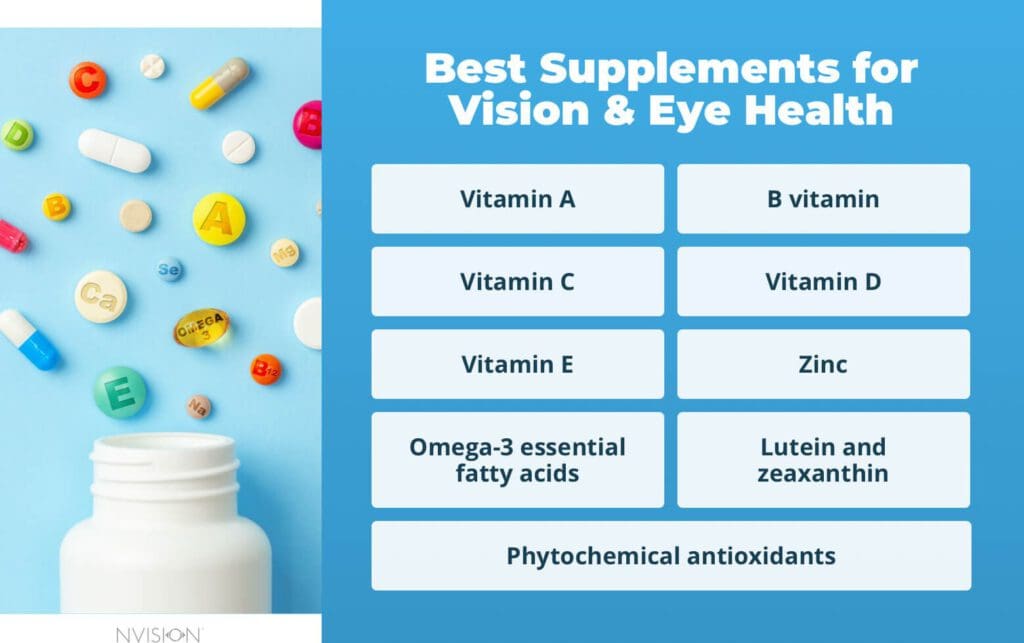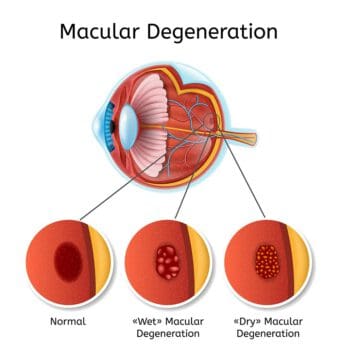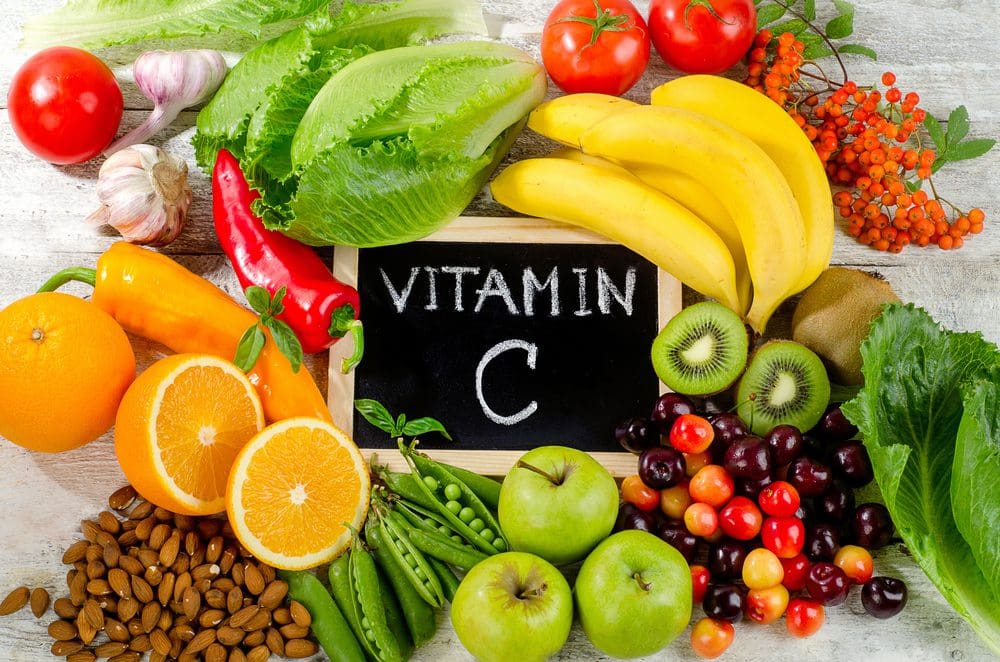Last Updated
The Best Eye & Vision Supplements (& Vitamins) in 2022
Home / How Diet Impacts Eye Health & Vision /
Last Updated
Table of Contents
In 2022, the market is saturated with multivitamins and supplements that claim to support eye health.
Studies have shown that there are many vitamins that do promote healthy eyes, and some may even help to decrease age-related eye conditions. Some vitamins and supplements can help to keep your body, and your eyes specifically, in optimal shape.
There is a lot of variation in supplements made specifically for vision, and there is limited regulation in the supplement field.
Dietary supplements and vitamins are not designed to replace a healthy diet or lifestyle. Before taking any supplements, discuss them with your doctor to ensure they are right for you personally.

Vitamins for Eye Health
Age-related macular degeneration (AMD) is an eye condition that is very common and one of the top causes of blindness in people over the age of 50. This condition can progress slowly and lead to deteriorating vision over time.

One of the ways to slow the progression of AMD is through a healthy diet and lifestyle. Taking care of yourself physically can go a long way in promoting eye health and therefore enhancing your vision.
In 2001, the National Eye Institute (NEI) performed a study called the Age-Related Eye Disease Study (AREDS) that tested certain vitamins and supplements for the eyes. The study showed that a specific combination of vitamins slowed the progression of intermediate or advanced AMD by as much as 25 percent. The second study of its type, AREDS 2 in 2013, expanded on this first study and modified the vitamin regimen.
NEI recommends the following vitamins for eye health based on the combination of the two studies:
- Vitamin C: 500 mg
- Vitamin E: 400 IU
- Zinc in the form of zinc oxide: 80 mg
- Copper in the form of cupric oxide: 2 mg
- Lutein: 10 mg
- Zeaxanthin: 2 mg
- Beta carotene: 15 mg
How Vitamins Support Vision
There are many different vitamins, many of which your body makes naturally, that can be taken as supplements to enhance your overall health and vision. Highlighted below are the specific vitamins that can help with eye health and how they work:
- Vitamin A: A precursor to beta carotene, vitamin A is commonly found in foods like carrots. It can reduce inflammation, protect the eye’s surface, enhance function of the immune system, and lead to better night vision.
- B vitamins: B-complex vitamins include B1, B2, B3, B6, B12, choline, biotin, and folic acid. They can help to lower inflammation and therefore decrease vascular problems involving the retina of the eye.
- Vitamin C: This vitamin can support the health of your blood vessels and help you absorb iron better. Vitamin C can also lower your risk for developing cataracts when taken as a regular supplement. We need this essential vitamin that is involved in nearly all levels of cellular function.
- Vitamin D: Necessary for bone health, vitamin D is often absorbed through exposure to sunlight. Vitamin D enhances bone and skeletal health. It can also be good for cell regulation, organ system function, and the eyes. Vitamin D deficiency is linked to diabetes, which can impact vision and the eyes. It can be taken in supplement form.
- Vitamin E: This antioxidant may help to prevent or delay the onset of AMD and also potentially minimize the risk for cataracts. Natural forms of vitamin E are more beneficial in supplement form than synthetic ones. You can tell the difference based on the prefix on the label. Natural forms of vitamin E are labeled with a “d-” prefix, whereas synthetic forms will have a “dl-” prefix.
- Omega-3 essential fatty acids: Fatty acids like omega-3s are often found in fish and fish oil. They have been linked to enhanced immune system function and healthy brain development. Two of the omega-3 fatty acids (DHA and EPA) serve to improve retinal function and visual development. Omega-3s may help to improve dry eyes and degradation of the retina.
- Lutein and zeaxanthin: Antioxidants and carotenoids located in the eyes, lutein and zeaxanthin help to filter out high-energy blue wavelengths of light that can be harmful to the eyes. Your body doesn’t produce enough of these carotenoids, which can be found in green leafy vegetables, so a supplement can help. Both lutein and zeaxanthin may help to minimize the risk for developing chronic eye diseases like cataracts or AMD.
- Zinc: This nutrient can help your body better absorb and use vitamin A. Zinc may enhance night vision as well as aid your body in producing protective pigment melanin in the eyes. Too much zinc can upset your stomach and cause issues, so you will need to carefully monitor dosage.
- Phytochemical antioxidants: Produced by plants, these chemicals can have antioxidant and health benefits. These plant-based chemicals may enhance vision and eye health as well as prevent eye issues related to aging and degenerative eye diseases.
Choosing the Right Supplements for Your Eyes

There are a wide variety of supplements on the market that say they are good for eye health, but not all of them are created equal. Always read labels carefully and talk to your doctor about what might be right for you.
If you are a smoker, for example, beta carotene supplements can increase your risk for lung cancer. Supplements and vitamins can also interact with medications you need to take or with certain medical conditions. Check with your doctor before taking anything.
Avoid products that contain a lot of fillers like wheat or corn and also those containing dairy. Capsules are usually easier to absorb and digest than tablets. You should also look for ingredients that are high in quality and bioavailability. Look for natural forms of the vitamins over synthetic versions.
Check expiration dates and pay attention to serving sizes. Not all vitamins and supplements contain recommended amounts of the essential and necessary vitamins intended to support eye health and vision. Check dosages, ingredients, bioavailability, and serving sizes to ensure that your chosen product will be as beneficial as possible.
Different vitamins can counteract each other and detract from their usefulness as well. Consider all the supplements you take before adding a new one to the mix.
hand holding vitaminsThe following are some popular brands of eye vitamins containing the recommended AREDS 2 formula and/or designed for eye health:
- Ocuvite by Bausch + Lomb
- Eye Health Formula by GNC
- Eye Health by Physician’s Choice
- PreserVision by Bausch + Lomb
- Vision With AREDS 2 Formula by Nature Made
While vitamins and supplements are designed to support your eye health and vision, they should be taken in conjunction with a balanced and nutritious diet. You can and should still take a multivitamin even when taking a specialty “eye vitamin” too.
It is important to remember that over-the-counter supplements and vitamins are not all the same in 2022. They may not have been evaluated by the FDA for efficacy. The best rule of thumb to follow is to talk to your doctor before taking any supplements or vitamins.
References
- Facts About Age-Related Macular Degeneration. (November 2018). National Eye Institute (NEI).
- Vitamins and Vision Loss. (December 2015). Harvard Health.
- Age-Related Eye Disease Study- Results. (May 2013). National Eye Institute (NEI).
- For the Public: What AREDS Means for You. (May 2018). National Eye Institute (NEI).
- Diet and Nutrition. American Optometric Association.
- Vitamin C. (2019). American Optometric Association (AOA).
- Emerging Research Vitamin D. (2019). American Optometric Association (AOA).
- Vitamin C. National Institutes of Health.
- Essential Fatty Acids Omega-3: DHA and EPA. (2019). American Optometric Association (AOA).
- Lutein & Zeaxanthin. (2019). American Optometric Association (AOA).
- Zinc. (2019). American Optometric Association (AOA).
- A Phytochemical-Rich Diet May Explain the Absence of Age-Related Decline in Visual Acuity of Amazonian Hunter-Gatherers in Ecuador. (February 2015). Nutrition Research.
- Ocuvite Eye + Multi. Bausch + Lomb.
The information provided on this page should not be used in place of information provided by a doctor or specialist. To learn more, read our Privacy Policy and Editorial Policy pages.